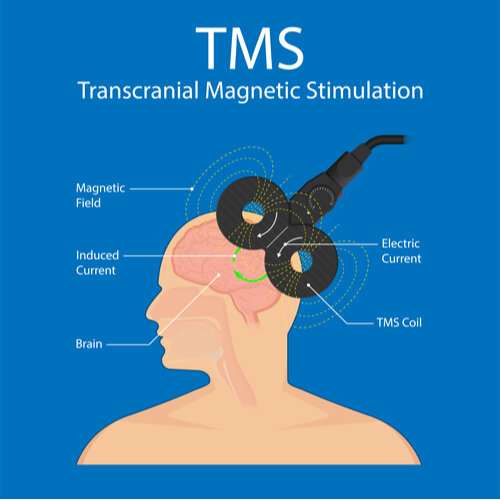Rewiring stroke survivors brains could alleviate depression

University of South Australia researchers have made a major breakthrough in the treatment of depression after stroke, using a high frequency brain stimulation device to improve low moods.
A trial led by UniSA stroke researcher Dr. Brenton Hordacre has found that large doses of repetitive transcranial magnetic stimulation (rTMS) significantly improve post-stroke depression by increasing brain activity.
Previous studies have experimented with the use of rTMS but this is the first time that a large treatment dose—30,000 electromagnetic pulses delivered over two weeks—have been trialed, showing positive changes in brain function.
The findings, published in the Journal of Neurology, could signal a non-invasive, alternative treatment for post-stroke depression in place of medication, which can have negative side effects for many people.
South Australians are set to benefit from this research with the brain stimulation device now available at UniSA's City West campus to treat stroke patients suffering depression.
The $40,000 brain stimulator, partly funded by the Honda Foundation, could also potentially improve motor recovery, helping stroke patients develop new connections in the damaged brain.
"The advantage of using TMS to treat depression is that it has relatively few side effects compared to pharmacological treatments," Dr. Hordacre says. "It can also be delivered over several sessions but the improvements in depression last well beyond that period."
An estimated 500,000 people in Australia are living with the effects of a stroke, and this figure jumps by 56,000 each year as a result of people suffering either an ischaemic (clot) stroke or a cerebral hemorrhage (bleed).
One in three people experience depression within five years of their stroke, mostly in the first year, although it can occur at any time.
"A stroke is a life-changing event in itself, bringing about personality, mood and emotional changes, so there is a very strong link between stroke, depression and anxiety," Dr. Hordacre says.
Antidepressants and psychotherapy are commonly used to treat depression post-stroke, but rTMS gives patients another option in the wake of these findings.
Adelaide resident Saran Chamberlain was one of 11 chronic stroke survivors who took part in Dr. Hordacre's trial, receiving 10 sessions of high frequency rTMS for depression.
Saran suffered a stroke in 2013 at the age of 38. She was not a typical candidate (non-smoker, healthy and young) but a stressful job and long work hours are believed to be the main factors in her case.
She was initially left completely paralyzed on the left side, and was prescribed medication to deal with the ensuing depression.
"When I heard about this trial using repetitive brain stimulation I was keen to try it to see if it made any difference," Saran said. "It did, and the effects lasted several months. I am still on antidepressants but I have reduced the dosage quite markedly. This really has made a difference to my life!"
Dr. Hordacre says the benefits of UniSA's brain stimulation device will extend beyond the community, with the university's allied health students trained to deliver the treatment under supervision.
The treatment will be officially launched in the new year.
More information: Brenton Hordacre et al, Repetitive transcranial magnetic stimulation for post-stroke depression: a randomised trial with neurophysiological insight, Journal of Neurology (2020). DOI: 10.1007/s00415-020-10315-6



















